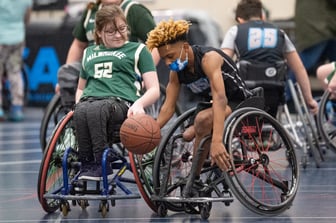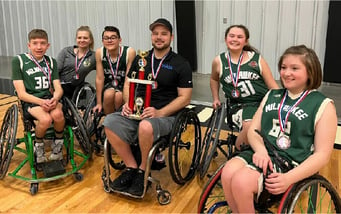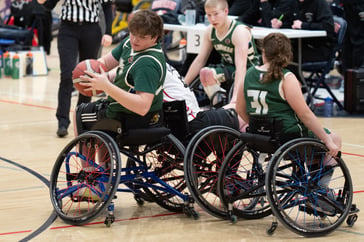When the Wisconsin Adaptive Sports Association (WASA) was looking for funding to grow its youth basketball program, the Christopher & Dana Reeve Foundation seemed like the perfect fit.
“The Reeve Foundation is so aligned with everything we want to do and become for our athletes,” says WASA’s Director of Business and Community Development, Sharon Rohde, who shares Reeve Foundation website information with WASA athletes and families. “When I read about the Reeve Foundation's mission and goals, they align with ours. We have so many points of intersection. Since we are traveling in the same lane, it is easy to build a partnership.”
WASA applied for and received a $24,500 Reeve Foundation quality of life grant earlier this year, which it used to purchase ten adaptive youth wheelchairs.

“Equipment is everything to us. It’s our golden egg, our secret sauce,” says Rohde. “It’s the only way our athletes can access an adaptive sport and achieve their goals. Often lack of adaptive equipment can be the biggest barrier to staying fit and being independent. It’s so important to have the equipment ready for kids who want to play.”
WASA was founded in 2015 with the help of a parent who was involved in a youth wheelchair basketball program for her athletic 13-year-old after she lost mobility from a rare bone cancer. Today the grassroots basketball program has grown to include ten sports and more than 170 athletes aged six and older with physical disabilities.

“Participating in a sport allows children to be active and helps them feel more like other kids their age,” says Rohde. “Adaptive sports give individuals with disabilities an opportunity to embrace teamwork, connect with their community and learn sportsmanship.”
WASA provides instruction, participation and competition for adaptive basketball, football, softball, tennis, bowling, bocce, lacrosse, quad rugby, sled hockey and goalball for those with sensory impairment. The organization also hosts The Big Cheese Wheelchair Basketball tournament, the largest of its kind in the Midwest, attracting over 25 teams.
“We keep getting requests to add more programs,” says Rohde. “There is so much opportunity to improve health, independence and quality of life through adaptive fitness and sports. Sports chairs of all sizes must be available at practices and tournaments to provide mobility and meet each athlete’s unique needs and provide a ‘different pair of shoes’ for independent competition.
WASA serves the entire state, but most athletes are from southeastern Wisconsin. Participation among urban Milwaukee youth is dramatically low, less than 5%. Only two of the 40 youth participating in WASA adaptive sports programs live in Milwaukee, Wisconsin’s largest city.
Eighty-two percent of Milwaukee Public School (MPS) students are economically disadvantaged. More than 500 students within the school district identify as living with physical disabilities. Access to adaptive equipment and transportation is challenging and expensive. Families cannot afford program fees, adaptive equipment, modified vehicles or transportation.
To reach this underserved population, WASA set a goal to educate families, teachers and healthcare workers about adaptive sports opportunities and facilitate youth participation by providing loaned equipment, scholarships for program fees and transportation to practices and games if needed.

With these goals in mind, WASA is working with MPS to educate all students about inclusion and adaptive sports, with youth actively participating using adaptive equipment provided by the Reeve Foundation. WASA also contacted area therapists to determine their needs and support them in building awareness about adaptive sports and fitness programs for their clients.
In a recent survey, 40% of WASA’s current youth participants noted that they feared the risk of injury while competing in sports. Another 20% were concerned about pain. For this reason, WASA prioritizes collaboration with physical and occupational therapists to support educational efforts and encourage youth participation.
“We wanted to make as many students as possible aware of our programs,” says WASA’s Outreach Director Maria Manby, who anticipates reaching hundreds of kids this year with these efforts. “We focus on relationship building and how we can maximize our impact — and the strategy is working. Once kids have a positive experience with wheelchair basketball, they are far more willing to try other sports.”



